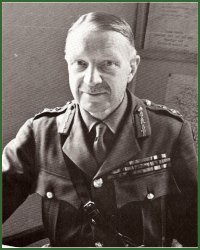Difference between revisions of "James Marshall-Cornwall"
(Assistant Chief of Secret Service until 1945 - referenced) |
m (Text replacement - "|wikipedia=http://en.wikipedia.org" to "|wikipedia=https://en.wikipedia.org") |
||
| (2 intermediate revisions by the same user not shown) | |||
| Line 5: | Line 5: | ||
|constitutes=soldier, linguist, spook | |constitutes=soldier, linguist, spook | ||
|description=Deputy Head of MI6 | |description=Deputy Head of MI6 | ||
| − | |wikipedia= | + | |wikipedia=https://en.wikipedia.org/wiki/James_Marshall-Cornwall |
|employment={{job | |employment={{job | ||
|title=Assistant Chief of Secret Service | |title=Assistant Chief of Secret Service | ||
| Line 22: | Line 22: | ||
He was apparently dismissed in the autumn of 1942 and spent the rest of [[World War II]] with the [[Special Operations Executive]] and [[MI6]], attempting to promote better relations between them.<ref>General Sir James Marshall-Cornwall". [[The Times]]. 31 December 1985.</ref> | He was apparently dismissed in the autumn of 1942 and spent the rest of [[World War II]] with the [[Special Operations Executive]] and [[MI6]], attempting to promote better relations between them.<ref>General Sir James Marshall-Cornwall". [[The Times]]. 31 December 1985.</ref> | ||
| − | He retired from the army in 1943<ref name="generals">http://www.generals.dk/general/Marshall-Cornwall/Sir_James_Handyside/Great_Britain.html</ref>. He was an old friend of [[Stewart Menzies]], who appointed him [[ | + | He retired from the army in 1943<ref name="generals">http://www.generals.dk/general/Marshall-Cornwall/Sir_James_Handyside/Great_Britain.html</ref>. He was an old friend of [[Stewart Menzies]], who appointed him [[Assistant Chief of Secret Service]] on 29 March 1943<ref>MI6: The History of the Secret Intelligence Service 1909-1949, p.476</ref><ref>[http://www.duncancampbell.org/menu/journalism/newstatesman/newstatesman-1990s/mums%20the%20word.pdf New Statesman, 9 March 1990]</ref> a job he held until 1945.<ref>Philip H.J. Davies, MI6 and the Machinery of Spying, Frank Cass, 2004, p.180.</ref> |
==Scholarship== | ==Scholarship== | ||
| − | He was wrote over 20 books<ref>http://www.amazon.com/s/ref=dp_byline_sr_book_1?ie=UTF8&field-author=James+Marshall-Cornwall&search-alias=books&text=James+Marshall-Cornwall&sort=relevancerank</ref>, mainly on military history and strategy, including | + | He was wrote over 20 books<ref>http://www.amazon.com/s/ref=dp_byline_sr_book_1?ie=UTF8&field-author=James+Marshall-Cornwall&search-alias=books&text=James+Marshall-Cornwall&sort=relevancerank</ref>, mainly on military history and strategy, including ''Foch as military commander''<ref>http://catalogue.nla.gov.au/Record/2164314</ref>, ''Grant as Military Commander'', ''Napoleon as Military Commander''<ref>http://www.amazon.com/Napoleon-Military-Commander-Classic-History/dp/0141391014</ref> and in 1984 a memoir, ''Wars and Rumours of War''.<ref name="generals"/> |
==External Resources== | ==External Resources== | ||
Latest revision as of 05:49, 5 July 2015
(soldier, linguist, spook) | |
|---|---|
 | |
| Born | 27 May 1887 |
| Died | 25 December 1985 (Age 98) |
General Sir James Handyside Marshall-Cornwall KCB, CBE, DSO, MC was a British Army officer, linguist and Assistant Chief of Secret Service.
Background
James Cornwall was born in India, only son of James Cornwall, the Postmaster General of United Provinces and his wife Agnes Hunter. He went to Rugby School and then the Royal Military Academy, Woolwich.
Intelligence Career
James Marshall-Cornwall joined the Intelligence Corps at Le Havre at the start of World War I. He distinguished himself and was posted to general headquarters in January 1916 with the rank of major.[1] He was transferred to the War Office in 1918 and in 1919, Cornwall was sent to the peace conference in Paris, where he worked with Reginald Leeper and Harold Nicolson on the new boundaries of Europe.
He was apparently dismissed in the autumn of 1942 and spent the rest of World War II with the Special Operations Executive and MI6, attempting to promote better relations between them.[2]
He retired from the army in 1943[3]. He was an old friend of Stewart Menzies, who appointed him Assistant Chief of Secret Service on 29 March 1943[4][5] a job he held until 1945.[6]
Scholarship
He was wrote over 20 books[7], mainly on military history and strategy, including Foch as military commander[8], Grant as Military Commander, Napoleon as Military Commander[9] and in 1984 a memoir, Wars and Rumours of War.[3]
External Resources
References
- ↑ http://www.andrewwilliams.tv/books/the-suicide-club/characters/
- ↑ General Sir James Marshall-Cornwall". The Times. 31 December 1985.
- ↑ a b http://www.generals.dk/general/Marshall-Cornwall/Sir_James_Handyside/Great_Britain.html
- ↑ MI6: The History of the Secret Intelligence Service 1909-1949, p.476
- ↑ New Statesman, 9 March 1990
- ↑ Philip H.J. Davies, MI6 and the Machinery of Spying, Frank Cass, 2004, p.180.
- ↑ http://www.amazon.com/s/ref=dp_byline_sr_book_1?ie=UTF8&field-author=James+Marshall-Cornwall&search-alias=books&text=James+Marshall-Cornwall&sort=relevancerank
- ↑ http://catalogue.nla.gov.au/Record/2164314
- ↑ http://www.amazon.com/Napoleon-Military-Commander-Classic-History/dp/0141391014